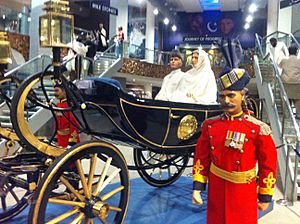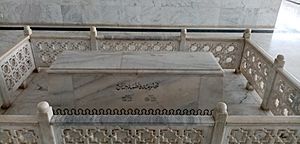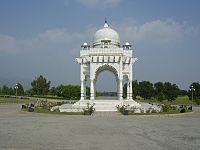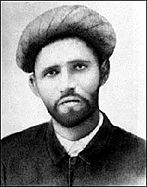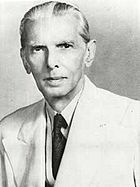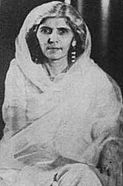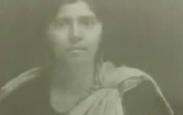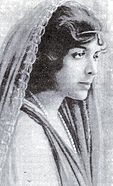Fatima Jinnah facts for kids
Quick facts for kids
Madar-e-Millat
Fatima Jinnah
فاطمہ جناح |
|
|---|---|
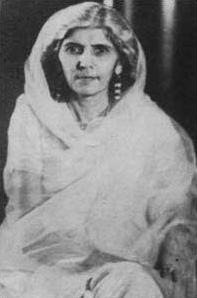
Fatima Jinnah
|
|
| Leader of the Opposition | |
| In office 1 January 1960 – 9 July 1967 |
|
| Preceded by | Position established |
| Succeeded by | Nurul Amin |
| Personal details | |
| Born | 31 July 1893 Kathiawar, Bombay Presidency, British India (Now, Gujarat, India) |
| Died | 9 July 1967 (aged 73) Karachi, West Pakistan, Pakistan (Now, Sindh, Pakistan) |
| Political party | All-India Muslim League (1947) Muslim League (1947–1958) Independent (1960–1967) |
| Relations | See Jinnah family |
| Alma mater | Calcutta University (D.D.S) |
| Occupation | Dental surgeon, stateswoman |
Fatima Jinnah (Urdu: فاطمہ جناح; 31 July 1893 – 9 July 1967) was a very important Pakistani leader. People often called her Māder-e Millat, which means "Mother of the Nation". She was a stateswoman, politician, and even a dental surgeon.
Fatima Jinnah was one of the main people who helped create Pakistan. She was the younger sister of Muhammad Ali Jinnah, who is known as the founding father and first Governor General of Pakistan. She also served as the Leader of the Opposition in Pakistan from 1960 until her death in 1967.
She earned a dental degree from the University of Calcutta in 1923. This made her the first female dentist in undivided India. After this, she became a close helper and advisor to her older brother, Muhammad Ali Jinnah. She was against the British Raj (British rule in India). She strongly supported the idea of two separate nations for Muslims and Hindus, known as the two-nation theory. She was also a key member of the All-India Muslim League.
After Pakistan became independent, Fatima Jinnah helped start the All Pakistan Women's Association. This group was very important in helping women who moved to the new country. She remained very close to her brother until he passed away in 1948. After his death, she was not allowed to speak publicly for some time. Her radio speech in 1951 was even censored by the government. She wrote a book called My Brother in 1955. However, it was only published much later in 1987 because of censorship.
In 1965, Jinnah returned to politics. She ran for president against the military ruler Ayub Khan. Many political parties supported her. Even though there were claims of political unfairness, she won in two of Pakistan's biggest cities, Karachi and Dhaka. Time magazine reported that she faced unfair attacks during her campaign.
Fatima Jinnah died in Karachi on 9 July 1967. There are some questions about how she died, with some reports suggesting it was not natural. Her family asked for an investigation, but the government did not allow it. She is still one of Pakistan's most respected leaders. About half a million people attended her funeral in Karachi.
Her legacy is remembered for her support of civil rights and her efforts in the Pakistan Movement. She was also very devoted to her brother. She is called Māder-e Millat ("Mother of the Nation") and Khātūn-e Pākistān ("Lady of Pakistan"). Many places and institutions in Pakistan are named in her honor.
Contents
Early Life and Education
Fatima Jinnah was born on 31 July 1893. She was the youngest of seven children in the Jinnah family. Her parents were Jinnahbhai Poonja and Mithibai. She was born in Kathiawar, Gujarat, which was part of British India at the time.
She was closest to her brother, Muhammad Ali Jinnah. He became her guardian after their father died in 1901. She went to the Bandra Convent school in Bombay in 1902. In 1919, she was accepted into the difficult University of Calcutta. There, she studied at the Dr. R. Ahmed Dental College and Hospital. After graduating, she opened her own dental clinic in Bombay in 1923.
Life with Muhammad Ali Jinnah
Fatima lived with her brother until 1918, when he got married. After his wife passed away in 1929, Fatima closed her dental clinic. She moved into her brother's home to help care for his daughter, Dina Jinnah. She also took charge of his household. This began a close partnership that lasted until her brother's death in 1948.
Political Life and the 1965 Election
Fatima Jinnah often joined her brother at his public events. In 1930, she traveled to London, England, where she learned to speak English. She lived there for four years. After returning to India, Jinnah worked to create a separate homeland for Indian Muslims.
During the division of India in 1947, Jinnah started the Women's Relief Committee. This group later became the All Pakistan Women's Association (APWA), founded by Rana Liaquat Ali Khan. She also played a big part in helping people who moved to the new country of Pakistan.
The 1965 Presidential Election
In the 1960s, Fatima Jinnah became very active in politics again. She ran for president of Pakistan as a candidate for a group of opposition parties. She called her opponent, Ayub Khan, a dictator. In her early rallies, about 250,000 people came to see her in Dhaka. A million people lined the road from Dhaka to Chittagong. Her special train, called the Freedom Special, was delayed for 22 hours. This was because people at every station pulled the emergency cord, begging her to speak. The crowds cheered for her as Madr-e-Millat, or Mother of the Nation.
In her speeches, she said that Ayub Khan had given control of the rivers to India by agreeing to the Indus Water dispute. She lost the election by a small margin, but she won a majority in some areas. The election was not a direct vote by all the people. Some journalists and historians believe she would have won if it had been a direct election.
Jinnah, known as the Madr-e-Millat, or Mother of the Nation, ran for president at 71 years old. She had not been very involved in politics since Pakistan's independence. She was a strong supporter of democracy. Because she was the sister of Muhammad Ali Jinnah, people respected her greatly. She became a symbol of the people's desire for democracy.
The election was held on 2 January 1965. There were four candidates, but the main ones were Ayub Khan and Fatima Jinnah. The campaign period was short, only one month. Public meetings were limited, and only members of the Electoral College and the press could attend. This made it harder for Jinnah to reach the public.
Ayub Khan had many advantages. He used his power as president to control the government during the elections. He also got support from businesses and government workers who benefited from his rule. Some religious leaders also supported Ayub Khan. They believed that Islam does not allow a woman to be the head of an Islamic state.
Jinnah had stayed away from political problems after her brother's death. But seeing her move through cities and even rural areas made her very popular. She called Ayub Khan a dictator. Her main point was that Ayub had given control of the rivers to Republic of India. Her campaign created huge excitement among the public. She attracted large crowds in all parts of Pakistan. However, her campaign faced challenges like unfair election rules and limited money.
Fatima Jinnah won the popular vote in the 1965 presidential election. However, through unfair practices and manipulation of the electoral system, Ayub Khan was declared the winner. Many believe she would have won if the elections had been direct. The election showed that people did not have a problem with women holding high offices. Even some religious parties, like the Jamaat-e-Islami, changed their view and supported Jinnah. They had previously said a woman could not lead a Muslim country.
Her Biography of Muhammad Ali Jinnah
Fatima Jinnah started writing a book about her brother, Muhammad Ali Jinnah. It was called My Brother. The book was not finished when she died. It was published by the Quaid-i-Azam Academy in 1987.
Death and Legacy
Fatima Jinnah passed away in Karachi on 9 July 1967. The official reason for her death was heart failure. However, some rumors suggest she might have been murdered. In 2003, her nephew, Akbar Pirbhai, brought up the controversy again. When she died, her private funeral rites were performed according to Shia customs. A state-sponsored public funeral followed. She is buried next to her brother, Muhammad Ali Jinnah, at Mazar-e-Quaid in Karachi.
Jinnah remained very popular and is seen as one of the greatest female figures in Pakistan's history. She helped inspire the movement for women's rights. In Pakistan, she became a national symbol. She received great honors from society after her death.
Family Photos
Places Named After Fatima Jinnah
- Fatima Jinnah Colony
- Fatima Jinnah Dental College
- Fatima Jinnah Medical University
- Fatima Jinnah Park
- Fatima Jinnah Women University
See also
 In Spanish: Fatima Jinnah para niños
In Spanish: Fatima Jinnah para niños
- Jinnah family
- Pakistan movement
- List of Pakistan Movement activists
 | Jewel Prestage |
 | Ella Baker |
 | Fannie Lou Hamer |


